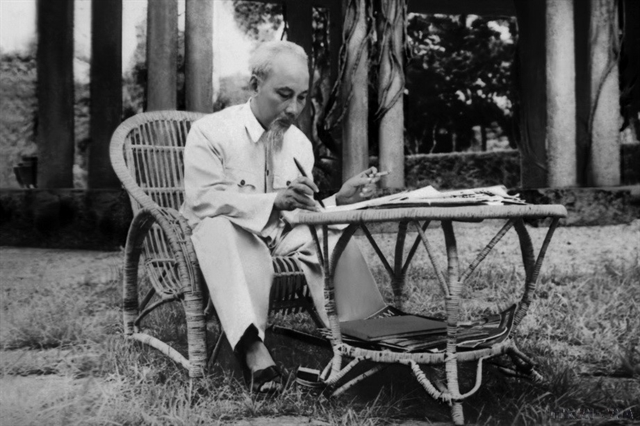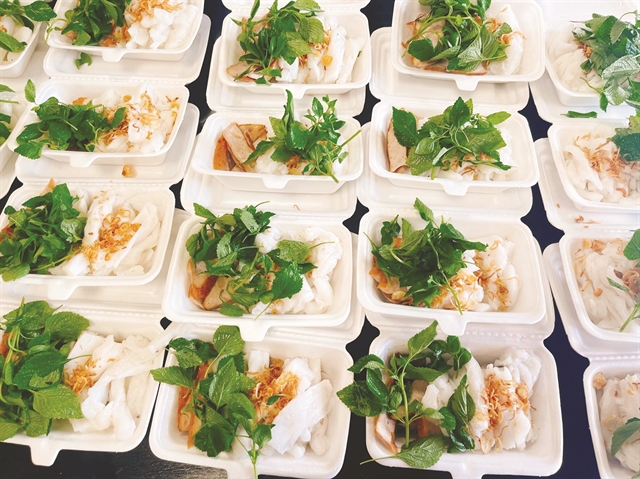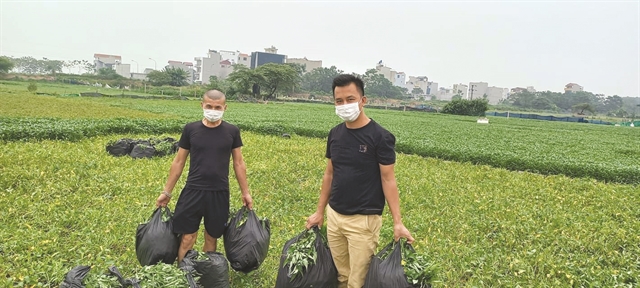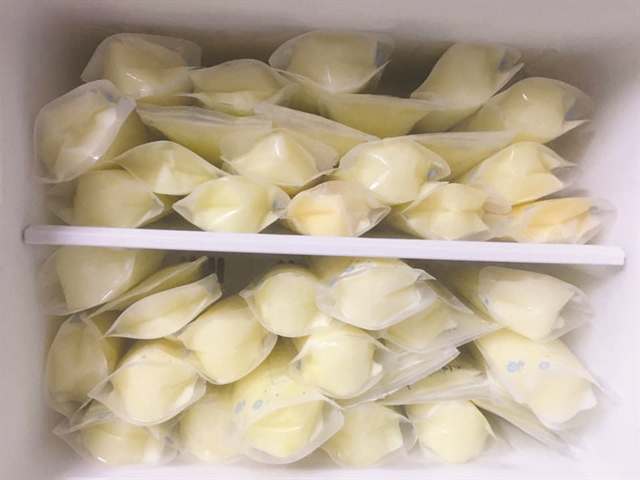 Features
Features

The pandemic has unveiled many dark corners of society we otherwise would not see, but it has also showcased many golden-hearted people, despite their limited resources, who still want to share with others. Kindness and logic shall help us through this ordeal.

|
| FREE NUTRITION: Nguyễn Hoàng Phương offers free rice crepes and 100 meals with rice, meat balls, fried eggs and vegetables. Photo courtesy of Phương |
By Nguyễn Mỹ Hà
We no longer live in ordinary times, so this is no longer an ordinary food review. Instead, it is a special column that will look out how managing basic food supply can keep people staying in quarantine and eventually stop the coronavirus from transmitting further.
Since Hà Nội was locked down on July 24, many manual labourers and migrant workers, whose incomes have been cut, have been stuck in the city without even the basic food needed to keep them going.
Online community groups have been set up to identify the destitute and offer help from private donors. In last year's social distancing periods, a local chapter of the Fatherland Front was responsible for identifying people who needed help and providing food supply to locked down communities.
This time, resources have slowly drained, and more people have been driven to poverty and not having enough food to get by.
Our country is currently undergoing a huge immunisation programme to get the majority of people above 18 vaccinated in the hope the population will be protected against this deadly virus.
The mainstream media has been working hard to tell the general public that if the majority of the population gets vaccinated, ideally by the planned next April, then we can achieve herd immunity.
As this column was getting ready for print, the UK Head of the Oxford vaccine group, Professor Andrew Pollard, previously an avid herd community theorist, said that it was clear the Delta variant was still infecting people who had been vaccinated.
He was quoted by major UK newspapers saying, "I think we are in a situation here with this current variant where herd immunity is not a possibility because it still infects vaccinated individuals."
He further referred to the idea as “mythical” and warned that a vaccine programme should not be built around the idea of achieving such immunity, arguing that "anyone who's still unvaccinated, at some point, will meet the virus... and we don’t have anything that will [completely] stop that transmission.”
This news could be all the more important for Việt Nam to keep on with its immunisation program, but to still maintain social distancing and lockdown to detect new cases and quarantine community cases.
Earlier assessment in the UK and US held that vaccines, if fully administered, nevertheless reduce COVID-19 related hospitalisation.
Five vital practices still need to be maintained: staying in, wearing face masks correctly, washing hands with soap or 70 per cent alcohol regularly, keeping 2m distance in public spaces, and filling in the country's health declaration.
Việt Nam is still far from vaccinating the majority of its population, so maintaining the above-mentioned practices will play a key role in getting the virus under control.
The key point here is that people stay in one place. If people can stay in, and get a food supply for their family for a certain period of time, the spreading of the virus can be detected and treated.
It is vital that our communities help each other during these most challenging of times.

|
| HELPING OUT: Tuấn Khoa farm offers up to 1 tonne of free morning glory every day, ready to be picked up in Hà Đông District. Photo courtesy of Vườn lan Tuấn Kho |
The issue here has become one of logistics: if you can provide a close-knit community with food supplies, only allowing those who have tested negative for coronavirus to drive the goods in and out of a community, then people can stay in one place. Food, after all, is an absolute essential.
This model has taken place in Hà Nội this last week, as authorised kitchens make food and see that it is delivered to addresses within a district.
Free portions of basic food including rice, noodles, fish sauce, cooking oil and some vegetables, were delivered to people who had not had a proper meal for days.
A full list of ward and local chapters of the Fatherland Front and contacts of people have been uploaded to the Hà Nội Pandemic Help group. If you need a meal, or food supply, let them know and they will send support your way.
Zero đồng minimarts also have been up and running in communities scattered around the city. People who get stamps issued by the local ward can buy the food supply that meets their needs.
The public response has been overwhelming.
"Please let me know people who needs rice and food to cook, I'm willing to help."
"We are harvesting one tonne of vegetables to give to people in quarantine camps, please contact us."
"Can anyone give a hand to deliver 1,000 boxes of food aid with me?"
"Is there any community in Hà Nội that needs rice and staple food that has received no aid so far?"
"I have mother's milk to offer to babies, please bring your styrofoam box to get it."

|
| MOTHER'S LOVE: Frozen breast milk to be given to new-born babies. Photo courtesy of Kiều Oanh Nguyễn |
"Anyone who cannot pay their rent and has been kicked out, please call me, you can live in our apartments for free. Beware, it's very modest but you don't have to pay for water and electricity."
These are but a few of the responses posted online, as communities throughout the capital pull together in ways that will make your heart soar and give you a new belief in humanity. During this pandemic, you can see kindness and camaraderie rolled out in the most suffering of communities.
The pandemic has unveiled many dark corners of society we otherwise would not see, but it has also showcased many golden-hearted people, despite their limited resources, who still want to share with others. Kindness and logic shall help us through this ordeal.
If a small community can help others to have enough food and maintain basic needs, a province can achieve this on a larger scale, and so the country can lock down to cut transmission lines.
In his statement, Professor Pollard said that around 600 people had died in the world from COVID during his two-hour meeting on the virus alone.
“We need some political action now to try to stop the deaths that will happen between now and the end of the year," he said, adding that a million more deaths were projected by the end of 2021.
"If that happens, it will be an enormous moral failure," he said, adding that scientists like him would feel it was a huge failure of humanity.
Aside from ensuring food supply, we must all play our part to reduce this tragic projection by reducing our intake, respecting health warnings and, most importantly, staying in one place. VNS




